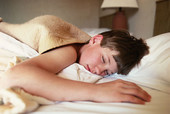
WEDNESDAY, May 9 (HealthDay News) — Children who wake up at night and are allowed to fall back asleep in their parents’ bed are less likely to be overweight than kids put back into their own bed, a new study says.
The study included nearly 500 Danish children aged 2 to 6 who had an increased risk of being overweight because they had a high birth weight, their mothers were overweight before becoming pregnant or their mothers were poor.
Children who never slept in their parents’ bed after waking up at night were three times more likely to be obese than those who went to sleep in their parents’ bed every night after waking.
The findings were to be presented Tuesday at the European Congress on Obesity in Lyon, France.
Previous research suggested that children who sleep in their parents’ bed after waking during the night have poor-quality sleep, which has been found to be associated with obesity. Based on those findings, it would seem that children who sleep in their parents’ bed would be more likely to become overweight or obese, according to the researchers.
That was not found to be the case in this study, however.
The results suggest that the positive parental social responses associated with allowing children to sleep in the parents’ bed creates a sense of security in the child and may protect against obesity, said study author Nanna Olsen, of Copenhagen University Hospitals in Denmark.
“[However], types of negative psychosocial responses, such as feelings of rejection when not being allowed to enter parents’ bed, may lead to overweight,” Olsen added.
Although the study found an association between lower body-mass index (a measure of body fat based on height and weight) and kids snuggling up with mom and dad, researchers didn’t prove there was a direct cause-and-effect relationship between the two.
Experts also note that research presented at meetings has not been subjected to the same type of rigorous scrutiny given to research published in peer-reviewed medical journals, and therefore should be viewed as preliminary.
More information
The U.S. Office of Disease Prevention and Health Promotion outlines how parents can keep their children at a healthy weight.

